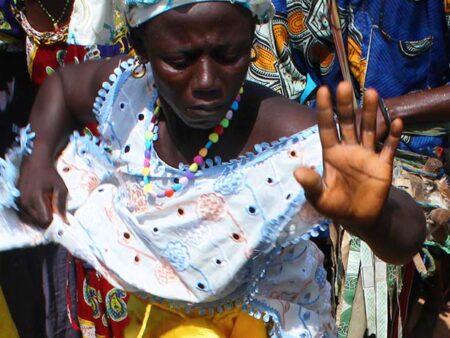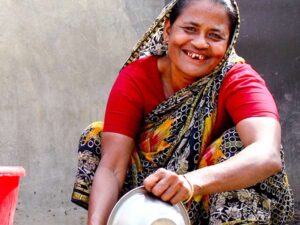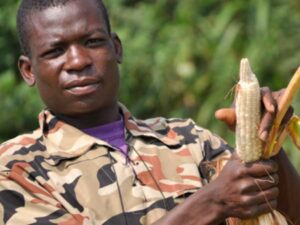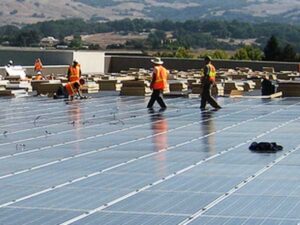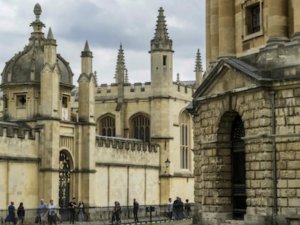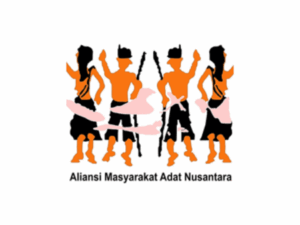Tostan collaborates with partners to provide educational opportunities in rural communities.
Yussuf Sané of Tostan spoke with Catherine Edwards on March 6, 2023. Click here to read the full conversation with insights highlighted.
Catherine Edwards: Could you start by introducing yourself and the problem that your work is aiming to solve?
Yussuf Sané: I am Yussuf Sané. I’m currently the National Coordinator of Tostan in Guinea-Bissau, and I’m a member of the Program Leadership Team.
There is a set of problems that Tostan addresses, and they’re mostly related to access, to empowering formal and non-formal education, especially in the context where we work, where poverty is prevalent and there are deeply entrenched and harmful social norms that create and perpetuate an environment which doesn’t allow people, especially women and girls, to develop, realize and sustain their vision of community wellbeing. It’s an opportunity to mitigate poverty and shift these deeply entrenched harmful social norms by providing critical information to people, unleashing or uncovering their aspirations, and supporting people to gain new skills. These skills will eventually enable them to develop, realize, and sustain their own vision for community wellbeing.
Catherine Edwards: Could you go into a bit of detail about the steps you take to address those problems?
Yussuf Sané: We mostly partner with rural communities to implement Tostan’s flagship program, which is the Community Empowerment Program. It’s a holistic human rights based and community-led learning journey, as we call it, where community members engage and participate in classes throughout three years of the Community Empowerment Program. Community members have the opportunity to learn about human rights, democracy, problem solving, hygiene, health, literacy and numeracy, use of new technology to support their newly gained awareness and knowledge in literacy and development, and also management.
Communities are also organizing collective action around what they’re learning and the decisions that they’ve made around these areas, mostly around human rights. We are able to track the community’s progress towards their vision of wellbeing across five domains, and that’s governance, education, health, environment, and economic empowerment.
Catherine Edwards: What is the specific demographic of the people who you are working with directly? And also, how do you reach and engage those people?
Yussuf Sané: We work with mostly rural communities, I would say more than 95% of the program participants have not been to formal school or have not had access to formal education. This is the first structured learning opportunity that most of them have had during their lifetime. These are adults and youth. The youth participants are often between 15 to 29 years old and the adults are 30 and above. Between the ages of 18 and 29, they are also adults, but we separate them to ensure that everyone is more comfortable. Everyone feels that the space for sharing, especially when we’re discussing more sensitive issues, there’s a safe space for sharing. We ensure that an age group that can share with each other are often in the same cohort whilst an elderly age group is also separated.
All of Tostan’s partner communities request the partnership. Some [do so] after having heard about Tostan on the radio, we have a radio program that enables current partner communities to share nationwide. In every country we’re working to share what they’re learning, how their lives have changed based on the knowledge they’ve gained, and what they’ve actually done with the new knowledge to transform their lives. Program participants have the opportunity on a weekly basis to share this. Communities that have not had this partnership yet learn, but they also gain interest and often they submit requests or applications for partnerships with the local administration or directly with Tostan’s office.
From the outset, any partnership between Tostan and a community is owned by the community because they seek Tostan out and they open up the space for the partnership. The community members also register to participate in the classes. The classes are usually between 50 to 70 participants, but we’ve found in recent years that number is going much higher than 70. For example, in Guinea-Bissau we have centers that have 155 participants. It was too difficult for one facilitator to manage, so we opened an additional center in that community to ensure that people were learning at the same level.
Catherine Edwards: What makes your approach different or distinctive compared to other things that are out there?
Yussuf Sané: I would say the community-led approach is very much an element of our success and it’s vital for sustainability. Decades of development efforts show that providing resources from outside of the community, or managing programs and projects wholly from outside of the community, doesn’t support the ownership of the process as much as a community led approach. What we’ve learned through Tostan’s experience and the creation of community management committees, which are decision making and collective action groups selected by community members themselves to lead the partnership in their village, is that by the time the three year program is over, the community management committees have complete ownership of the program and the process. The community management committees are a 17 member decision making leadership and collective action group selected by community members themselves, and they often have up to nine members who are women. This is very important that community members, communities are leading the process because partners come and partners go, but the community members stay. If we build the capacity of local human resources, we can certainly sustain our efforts more over the long term.
I would say also, trust. There are very human relational elements to Tostan’s success, and I believe that communities trust that we are there to support their vision of wellbeing rather than our own. I think starting off with what the community values is a key success for Tostan. What are the values of the community and how do they envision their future, their wellbeing, based on those values?
Catherine Edwards: How do you find that out?
Yussuf Sané: We do visioning exercises with the communities where they actually draw what their values look like, how people are relating with each other when they’re living in wellbeing, and when those values, when human rights are respected. What does the world look like for them? They have a visioning board that they use as a reference to navigate towards their vision of the future. They also engage in values deliberation, which is an assessment of what their vision of wellbeing is, and where they are today in terms of that vision. What are the attitudes, the practices, and the behaviors that contribute towards progress for them as individuals and as a community towards their vision of wellbeing.
They assess, “Okay, we said in our community there is education for all.” Perhaps they also, through a values deliberation, identified certain households where girls aren’t going to school because they’re taking care of more chores in the house. “Does this align with our vision of education for all?” Then, the community members themselves have the knowledge to see that it doesn’t align with their vision of education for all, so they propose solutions to ensure that if there are children in the community that are not going to school, that they can go to school. What are the solutions, what are the pathways to resolve issues that are preventing children from going to school? This is just one example, and there are many across the domains of governance, education, health, environment, and economic empowerment.
Catherine Edwards: How do you measure the success of the work?
Yussuf Sané: Tostan has a monitoring and evaluation system. We start at the very beginning of our partnership with communities. We conduct a baseline study of approximately 60 indicators across the five domains that I mentioned, governance, education, health, environment, and economic empowerment. We monitor some of the indicators throughout the entire three year period of the program, mostly output indicators and some outcome indicators, and we evaluate progress every year of the program. After the first year and after the second year, we conduct a midterm evaluation, and then a final evaluation.
Catherine Edwards: Can you share the results on that? Do you know what the evidence is? Is there a typical amount that it tends to increase?
Yussuf Sané: What the evaluations show us, and especially after the first year, is that there’s a lot more confidence. Women have a lot more confidence to participate in decision making at the household level, at the domestic level, and at the community level. We see this in terms of women who are saying that their husband reached out to them for key decisions in the household, which didn’t happen before. We’re working in communities where prior to the program, women did not participate in decision making at all. That’s actually the baseline situation and even after the first year, we’re seeing women who are increasingly telling us that their husbands reach out to them for key decisions in the household and they feel more confident sharing their ideas in a community meeting. They participate in a community meeting and feel more confident sharing their ideas.
We also have a higher number of children being registered at birth, children attending school. In terms of health, we have greater awareness about the importance of corporal and environmental hygiene. This has an impact on the community’s health. What we’ve seen over the long term is that communities adopt practices that are more positive to their health and abandoned practices that are harmful to their health, especially practices that are harmful to the health of women and girls such as female genital cutting, child marriage, and domestic violence.
In other areas, like governance, we’ve seen many women have been selected to be leaders in the community management committee. These women have been elected to leadership positions and their local government office. We’ve had more than 30,000 women who have been elected to leadership positions in their local government offices. They attribute this to the experience that they had with Tostan through the Community Empowerment program. Now, over 9,500 communities have publicly declared abandonment of FGC and child marriage. We’re seeing communities collaborating more with their local government officials to ensure that there is more transparency and accountability in local governance.
Catherine Edwards: Since the program’s been running for quite a while and you’ve had all these large scale successes, it’ll be interesting to know about challenges that you’re facing. We know that funding is often a challenge for social innovators, but aside from funding, what have been any major challenges that you’ve either faced and overcome or perhaps challenges that you’re still facing?
Yussuf Sané: Funding, as you mentioned, is a major challenge. One point in our new strategy, which we’re In Partnership for Community Wellbeing, is to ensure that there is increased funding and increased access to resources for our partner communities. One of the major barriers we see is that communities can access those resources if we take the action to ensure that we remove those barriers. Whether it’s at the government level, whether it’s at a donor level or financial partner, if we remove those barriers, we’ll allow a greater number of communities to access the resources and to achieve their vision of the future.
When we work with communities, we provide grants of $800 US dollars or sometimes a bit more to community management committees to enable them to have the experience of managing micro projects or micro-credit funds at the local level. We’ve learned that very often, if not always, community members are able to respect the commitments that they make in relation to these grants. I think there’s a need for increased trust in the funding field, especially trust for communities and their ability to respect commitments and to respect their engagements.
Catherine Edwards: If someone was looking to do something similar to what you’ve done, perhaps in a different area, what would you say are the key things they would need to do or the key things they would need to understand in order to have the best chances? For example, what’s the one thing that has worked really well or maybe something that you tried that you thought would work well but it didn’t?
Yussuf Sané: There are many lessons learned at Tostan, and it’s the communities that have supported Tostan to more successfully work in partnership and more successfully work in service to communities. I think the first lesson is to listen to the community. They understand their experience and their situation more than we do. We are there to support and we are there to provide a framework for their progression towards their vision, however, the content is very much coming from the communities themselves.
It’s also important to ensure that there’s a good degree of cultural and contextual proximity to the communities where we are working. Throughout the three years of Tostan partnering with communities, we have had a facilitator that is not a member of the community but lives with the community, facilitates the sessions of the program throughout the three years, and supports the community management committee in implementing their activities. It’s very important to have somebody who understands the local context, who understands the cultural context coming from the communities. This person is often also going to be a trusted source of information.
We believe that every community has potential and it’s our role to support the community to unlock that potential. That means we have to believe that the potential really exists first, and that there are resources, people in the community, that can help this transformation happen. We can benefit from sharing lessons learned from communities, with other communities. We do that quite often. Once we learn about an initiative that has occurred in one community based on what they’ve learned from the classes or their engagement with each other, we’re very quick to ensure that this is a lesson learned and can be applied by other communities. We share success stories with communities to ensure that this success is happening at a greater scale.
Catherine Edwards: How easy is it to scale up when that’s needed? Would you be able to do that in other places if the classes grow?
Yussuf Sané: That’s a good question and it’s one of the major challenges we faced when we were scaling. In 2021, we started a new program cycle and in Guinea-Bissau we moved from 40 communities to 100 communities. In Gambia, it was 30 communities to 60 communities. In Senegal, there were up to 120 communities. What we learned was that we needed to have more time to assess what’s the rate at which community members are interested in engaging with the program. We say the classes are 50 to 70 participants, but often communities may decide, “Well, we have 90 participants that are available and want to learn about human rights and democracy and want this access to education.” We find that this is often quite challenging because at one end we have to have something standard, which is a more or less a fixed number of participants. On the other hand, it’s the human right to education. How do we balance the standardization and a very basic human right? We’ve decided to set a cutoff, a deadline, for when people have to register. By the third month of the program, we would not count any more new participants, but everybody is welcome to participate in the classes. The registry will not change after the third month, but everyone is welcome to participate whenever they want and engage in the conversations.
The reason it was a challenge is because we evaluate what has been learned throughout the three years of the program, and so if we don’t have a stable number of participants and people are coming and going, then we wouldn’t know who to evaluate and how to evaluate each person. Once we have a fixed number of participants throughout the three years, then that problem becomes settled and we ensure that people who want to engage on a regular basis, though they have arrived later, can also do that.
Catherine Edwards: As well as working directly with the communities, are you also working on advancing system level change in the field? Which other actors need to get involved for any system level change to happen?
Yussuf Sané: We are involved in systems change at different levels, starting at the community level. We’re working around social systems, especially the social norms that can be a barrier or prohibit the potential of key members of the community, especially women and girls. Ensuring that the norms around the community promote inclusion, promote participation, and promote gender equality in every community where we’re working.
We’re also working to transform government systems, local government especially, so that they can be more responsive to communities’ needs, to communities’ aspirations, and to communities’ actions. We learned in our experience that community members can gain knowledge, they can learn about their human rights, they can have motivation, and they can seek out those rights at higher levels. When they do, they may find that the administrative and the government system is not prepared to support them to meet those rights. We are working today through one of the programmatic innovations that Tostan has come up with recently strengthening democracy and civic engagement to ensure that local government officials better understand their roles and responsibilities towards communities and to ensure that they include and ensure participation of communities in local planning efforts and participatory budgeting. With recent experiences that we’ve had in Senegal, Mali, Guinea, The Gambia, Guinea-Bissau, we’re seeing that more local government entities are now reaching out to communities to plan collectively and to ensure that they’re allocating resources more appropriately.
Catherine Edwards: What’s next for Tostan? How do you see the work evolving, say, in the next five years?
Yussuf Sané: We have an ambitious strategy to 2030, actually, `In Partnership for Community Wellbeing` where we will be expanding to new networks of communities in concentration countries. That’s Senegal, Guinea-Bissau, and The Gambia. In these countries and other countries where we will have affiliates or where we will catalyze efforts, we’ll be working with ecosystem actors so we can catalyze the ecosystem in a way that the actors are collaborating and working in unison towards the community’s wellbeing. These are communities in countries where we are directly implementing the Community Empowerment Program. Perhaps communities in countries such as Guinea and Mali where we have Tostan affiliate organizations, or in communities that are reached through organizations that have been trained at the Tostan Training Center in Thies. Mostly there’ll be communities that are somehow benefiting from Tostan’s community of practice. We’re also working to deepen the connection of communities to resources and partners that will enable that beyond the direct partnership with Tostan, so they can continue moving towards their vision of wellbeing.
We’ll be working in partnership with ecosystem actors in ways that I think we have not done before and that’s quite exciting. That partnership is at the heart of this new strategy and we’ll be working with ecosystem actors, including government officials. We’re working with religious leaders, networks, funders, networks, civil society organizations, and even community members from previous program cycles. It’s an exciting future that’s been designed in the strategy.
Catherine Edwards: Is there anything that we didn’t cover that you think is important to add about your work or the impact?
Yussuf Sané: It’s important to note that we are going to also measure our success in terms of what the communities want for themselves. We have a framework that is very much informed by what communities have told us is important for them in the past, so it’s a common framework for communities. We respect that each community has its own aspirations, and that’s something we’re going to have to measure, that the communities are realizing their visions of the future. We also have the responsibility to connect that to the global goals, the sustainable development goals, to highlight how community initiatives, how community contributions, are enabling us to live in wellbeing on a global scale. We definitely have to be measuring our progress towards the SDGs.
Catherine Edwards: Thank you so much, it’s been super insightful to hear about your work.
Click here to read the full conversation with insights highlighted.
Catherine Edwards is a journalist and content strategist based in the UK, having also lived and worked in Germany, Italy, Sweden and Austria. She supports newsrooms and mission-driven organisations with content strategy, audience development and constructive journalism.
* This interview has been edited and condensed.
Find other social innovators working in rural communities.

